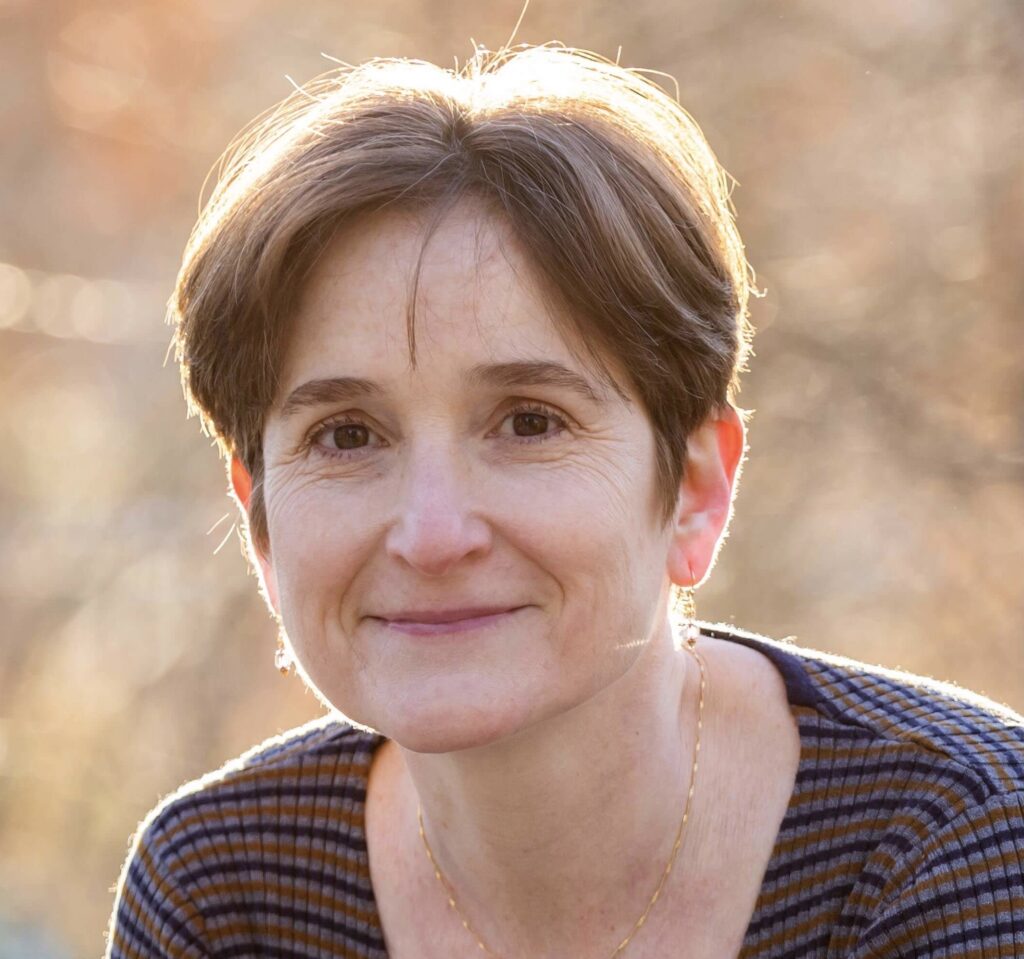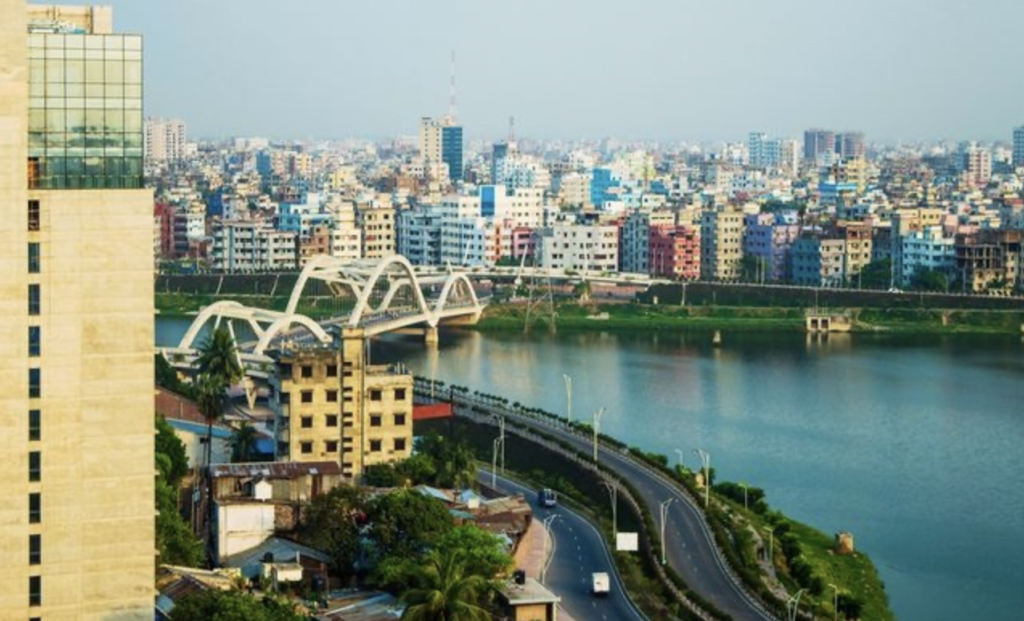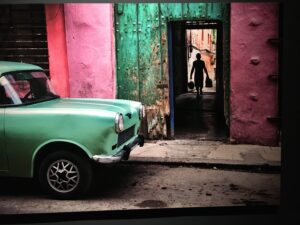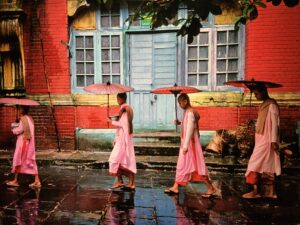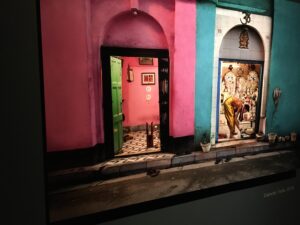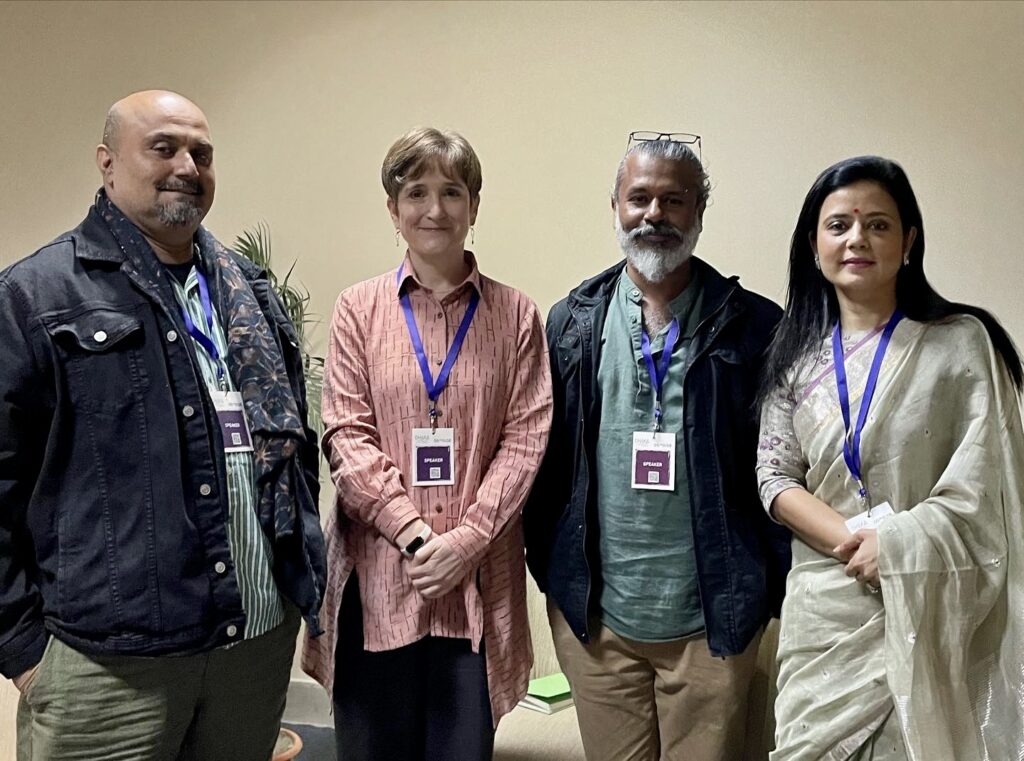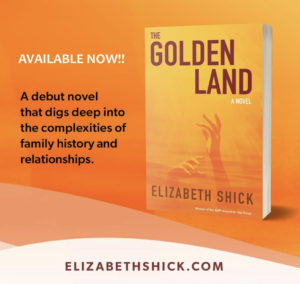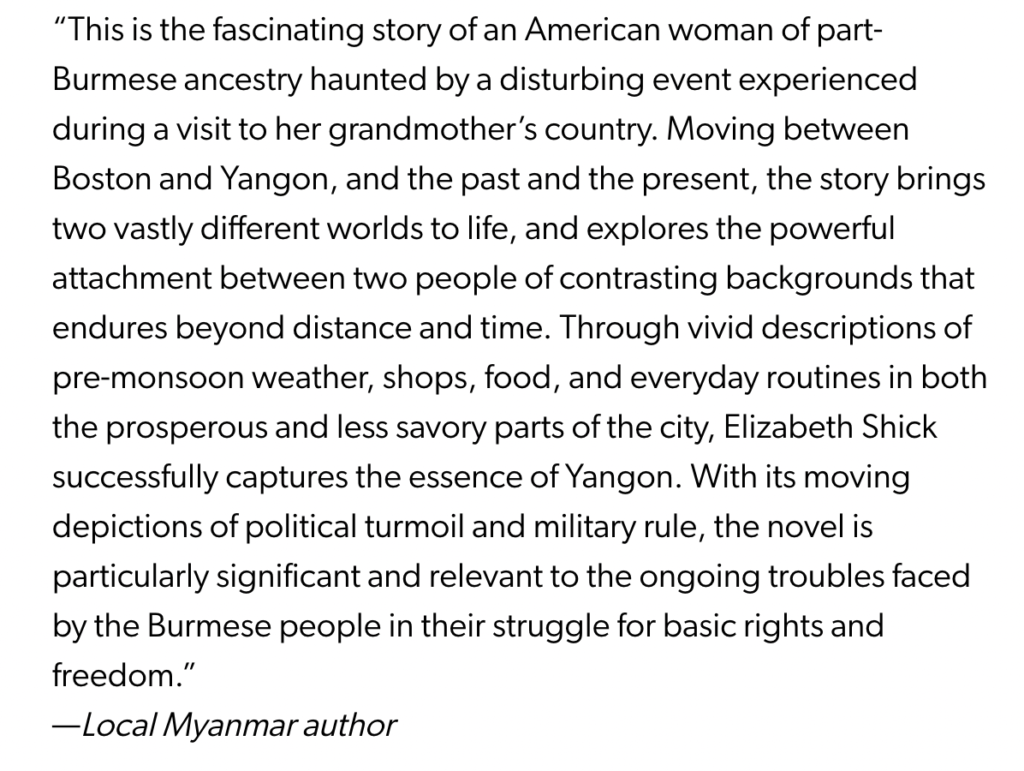EPISODE 40,
January 26, 2023
Introduction
Originally from Massachusetts, Elizabeth (Liz) Shick began her international journey as a young college student when in the mid 1980s, majoring in Africana Studies, she spent a year at university in Tanzania. Thereafter, she went on to obtain a Master’s of International Affairs in Economic and Political Development at Columbia University. This opened the door to a career in humanitarian affairs and development with country postings in The Gambia, Angola, Mozambique, Italy, Malawi, Myanmar, and Dhaka, Bangladesh, where Liz, along with her Italian-Australian husband, is currently living and working. While living in Rome, she took a creative writing course. A year later and living in Malawi, she began her first novel. Liz’s Malawi novel was not published, but her second novel, The Golden Land, inspired by six years living in Myanmar, won the 2021 Association of Writers and Writing Programs Prize for the novel.
TRANSCRIPT
[00:00:00] Louise: Welcome to Women Who WaIk. I’m Louise Ross, writer and author of Women Who Walk the book, the inspiration for this podcast. And just as I did for the book here, I’ll be interviewing and unpacking the journeys of impressive, intrepid women who’ve made multiple international moves for work, for adventure, for love, for freedom – reminding us that women can do extraordinary things. You can find a transcript, with pictures, to each episode, and my books on my website, LouiseRoss.com.
[00:00:47] Louise: Hello, listeners. Welcome to Episode 40 of Women Who Walk. My guest today is Elizabeth Shick. I met Liz via a Facebook group created by one of my very early podcast guests, Andrea Barton, who also interviews many fascinating international women writing about their journeys. If you are curious to learn more about Andrea and her Facebook group, Expat Writers, have a listen to Episode 4.
[00:01:18] Louise: Now to Liz, who, along with her husband, is currently living and working in Dhaka, Bangladesh. Originally from Massachusetts, as a young college student in the mid 1980s, Liz majored in Africana Studies and spent a year abroad at university in Tanzania studying Literature and Revolution, Imperialism and Liberation.
[00:01:44] Louise: After college, she went on to obtain a Master’s of International Affairs in Economic and Political Development at Columbia University. This opened the door to a career in humanitarian affairs and development with country postings in Angola, Malawi, Mozambique, Myanmar, Tanzania, The Gambia, and Italy.
[00:02:09] Louise: Along the way, she met and married her Italian-Australian husband and raised two daughters. And then just shy of 40, while living in Rome, she wrote her first short story. A year later and living in Malawi, she began her first novel.
[00:02:29] Louise: Liz’s Malawi novel was not published, but her second novel, The Golden Land, inspired by six years living in Myanmar, won the 2021 Association of Writers and Writing Programs Prize for the novel.
[00:02:46] Louise: In an article Liz wrote for BooksByWomen.org in December, 2022 to coincide with the launch of The Golden Land, she says the following:
[00:02:57] Louise: “When we moved to Myanmar in 2013, after half a century of military rule, Myanmar was just beginning to open up to the world again. Our arrival coincided with a return of many so-called “repats,” former Burmese nationals who’d been living in exile in different parts of the world for decades. I knew what it was like to live far from home, but could only imagine how it must feel to return after 20, 30, 40 years of absence. Not to mention the political turmoil the country underwent during that period. What had their lives abroad been like, these repats, and how did it feel to now leave that other country and return to this place of their youth? The Golden Land was inspired by these and other questions about culture, identity, and belonging that have continued to pull at me throughout my life.”
[00:03:57] Louise: The title of this article is “How Living Abroad Informs and Inspires My Writing.” I’ll link to it and Liz’s website and social media in the transcript to this episode, but now to my conversation with Liz about her experiences living 27 years far from home.
[00:04:15] Louise: Just before we segue, early on in the interview, I mention an American photographer, Steve McCurry. His name may not be familiar, but many listeners will recognize his iconic image of a young refugee Afghani girl with enormous, expressive green eyes that appeared on the front cover of the June, 1985 edition of National Geographic.
[00:04:54] Louise: Welcome to Women Who Walk, Liz. We had some technical issues on Monday, in fact, listeners, I’m actually doing a second interview with Liz, so we will be on the ball, I think, because we’ve already had a, a very big discussion. But it’s recording. Technically we’re set. And so Liz, you are in Dhaka, in Bangladesh and to start, I’d love for you to set the scene for us. Perhaps describe the view out your window and the street scenes beyond your home.
[00:05:25] Liz: Sure. I’d love to. And thank you for having me again. I’m sitting in my 12th floor apartment, so I have a very good view of Dhaka, and the thing that really stands out to me when I look out the window here is the fact that it’s such a big city, over 22 million people, and yet there are no skyscrapers. It’s just a sea of medium-sized buildings, some are a little bit smaller than ours, some are as high as 20 stories. I think there are downtown a few that maybe reach 40 stories, but nothing like the skyscrapers in most big cities. So that’s really unusual. And the other thing that is really nice is that many of them are painted in pastel colors.
View of Bangladesh cityscape, with multi-colored, pastel high-rise apartment blocks
[00:06:10] Liz: Again, right from the window here, I can see a lavender colored one, a yellow one, a light blue, um, an orange and yellow one, and another one that has alternating floors of blue and green, which is, is just really nice. It gives it a lot of, um, charm, I think. And then, my neighborhood, it has a, an artificial lake on one side, which is very long and narrow, so it looks like a river and that is lined with palm trees. It’s, it’s quite tropical looking as well.
[00:06:41] Louise: In the pre-show chat, I’d mentioned to you that I’d seen this exhibition by American photographer Steve McCurry, and he, uh, juxtaposed some photos of India, it wasn’t Bangladesh, it was another huge city in India, with pictures of Cuba and pictures of Myanmar, where you also lived.
American photographer Steve McCurry’s exhibited streetscape images, L to R: Cuba, Myanmar, India
[00:07:02] Liz: Mm-hmm.
[00:07:03] Louise: And, and we’ll get to that. And interestingly the landscape or the, uh, pictures of the, the streetscapes, I should say, were very similar in terms of the colors that you are describing.
[00:07:13] Liz: Mm-hmm.
[00:07:14] Louise: Also, I, I do recall you mentioning on Monday that the air quality is not good.
[00:07:20] Liz: Yes.
[00:07:20] Louise: In Bangladesh.
[00:07:21] Liz: Yeah. Yeah. Didn’t wanna, you know, dwell on the negative, but unfortunately there’s very poor visibility because air pollution is a major problem here. It’s, um, kind of vies with Beijing and, and Delhi for being the worst air quality in the world, which is not a, a very nice distinction to have.
[00:07:41] Louise: And yet you can still see those glorious colors.
[00:07:43] Liz: Yeah, I can still see the colors. I mean, these buildings are pretty close to me. I, I just can’t see in the distance very far.
[00:07:51] Louise: So, um, my Romanian guest from Episode 26 lived in Dhaka as a teenager with her family, and that was about 12 years ago, and she talked about it as quite a unique place and that the expat community is quite small and concentrated and thus socially active. Is that your experience?
[00:08:10] Liz: Well, we’ve only been here for a few months, so it’s probably still a little too soon to tell, we’re just getting to know people. But yeah, I, I would say so far it seems to be both a very vibrant expat community and also very vibrant host community.
[00:08:26] Liz: The weekend here starts on Thursday night, which is what it is. It’s Thursday evening for me, so it’s, it’s already the weekend.
[00:08:33] Louise: Oh, okay.
[00:08:34] Liz: And this weekend we are invited to a, a big festival that the host government is putting on called the Pitha Utshob celebration, which is a winter celebration of locally made pastries. There are different kinds of, like pancakes or dumplings that are filled with, with things that can be either savory or sweet. So that sort of thing makes it really fun. I, I love learning about cultural things like that, and food is definitely very important in Bangladesh. They, they always are talking about food and they love eating and the food is delicious.
[00:09:10] Liz: Another really interesting cultural event that I was lucky enough to participate in about 10 days ago was the Dhaka Lit Fest, which is a big festival focusing on literature, as the name suggests, but also it had music and art exhibits. And that was really, really exciting for me as a writer to participate in that.
[00:09:30] Louise: Mm-hmm. Were you presenting your new novel?
[00:09:33] Liz: I wasn’t presenting my new novel, but I was actually invited to be on a panel. And I was actually on this panel with Shehan Karunatilaka , who is the 2022 Booker Prize winner. So that was quite an honor, to sit next to him. Hear him talk. The panel was about state violence against civilians in Southeast Asia. So both of our books touch on that.
Dhaka Lit Fest in Bangladesh, January 2023, Liz with guest panellists.
L to R: Booker Prize-winning author Shenan Karunatilaka, Liz, Iffat Nawaz, Vivek Menezes & moderator Mahua Moitra.
[00:09:58] Louise: I talked a little about your new novel in the introduction, based on your many years living in Myanmar and we’ll get into that later in the interview. Um, I just wanted to ask you is it a four day week there or is, or is the week from Sunday through Thursday?
[00:10:13] Liz: It’s Sunday through Thursday. Because it, it’s a Muslim country, so Friday is the holy day and they have Friday and Saturday off, which takes a lot of getting used to. I have to say, having a, a week that ends on a Thursday and starts on a Sunday, has taken me like several months to, to get used to. It’s nice in a way because, Sunday when we start our work week here, it’s almost like a bonus day because you know that people aren’t working everywhere else in the world so you can kind of catch up with everything. But it does mean that combined with the time difference, which, most of my business is with the US, so that’s an 11-hour time difference, it means that I have to wait until the end of my second day of my week, so my Monday, which was like a Tuesday and another place Tuesday night, um, to reach out to people on a Monday morning, if that makes sense. It’s very confusing.
[00:11:07] Louise: Challenging to get used to that. Yeah. Now, obviously from your accent, we know that you’re originally from the US from Massachusetts, in your bio on your website, you say you grew up dreaming of other worlds, both real and
[00:11:21] Liz: mm-hmm,
[00:11:21] Louise: imagined. And so I’m curious, what were the circumstances of your childhood that led to you to dream about other worlds?
[00:11:28] Liz: That’s a good question. I’m not sure that I completely know the answer. I had a pretty ordinary childhood. I grew up in a suburb of Boston called Newton, Massachusetts, which was a nice place to grow up, but it was pretty homogenous. So I didn’t actually have very much exposure to other cultures, at least not in, you know, the usual sense. But, I still was very interested in, I guess I’ll call it like microcultures of other families in my neighborhood and I was very interested in how each one is slightly different and you know, why is that, why does like one household eat a certain kind of food and the other doesn’t or, even meal times or different parenting practices. And that, that was just always fascinating to me.
[00:12:17] Liz: I always had that interest, but I don’t think I fully understood about other worlds or other countries and cultures until much later in my life. That said, I liked the sound of country’s names. Places like Burma, which is what Myanmar used to be called, or Zimbabwe, um, Brazil, all these places that they just were so interesting to me.
[00:12:42] Liz: I used to sometimes pretend that, um, I could go to them in my closet, that my closet was like secret kind of portal to these other worlds. Not just those real places, which were still kind of imagined in my head, but also made-up places. I mean, sometimes I would just think about going to a place that was completely made-up.
[00:13:03] Louise: That reminds me of the book, The Lion, The Witch and the Wardrobe, where the children go into another world when they step into their wardrobe. Had you read that as a child?
[00:13:12] Liz: You know, I actually don’t think I read it as a child. I have read it since as a mother to my children, but I don’t remember reading it as a child. But it is a similar concept. It’s true.
[00:13:24] Louise: Hmm. It is. Yeah. And so was it because of your curiosity about other countries, other worlds that encouraged you to major in Africana studies?
[00:13:36] Liz: Yes, absolutely. I went to a liberal arts college in upstate New York called Vassar College. When I got there and began looking through the course catalogue, I felt like I was a kid in a candy shop, cuz I, I was so excited to learn about all of these different ideas and places. It was just really, really fascinating to me. So I took classes at random. I didn’t really think about any kind of plan, which is very typical for me, just followed my interests and I ended up having this one professor. We called him Mr. Mamiya, Lawrence Mamiya was his full name. And he taught in the Africana studies department and also in the religion department. I ended up taking a lot of religion courses as well. And I just kept taking more and more courses with him. Until eventually I asked him if he would be my advisor for the major. And, and that’s kind of how I came to Africana studies.
[00:14:32] Liz: One of the things that he put me on to, he had started a special program in a maximum security prison, which was near Vassar College, and we could get course credit for volunteering in this maximum security prison. That was just a real eye-opener for me, because again, I’d had such a sheltered childhood, really, like I just didn’t understand about the inequities in our society. That was really a really good experience.
[00:15:00] Liz: In one of his classes or one of the Africana studies classes that I took, I remember meeting this other student who had just come back, she was a couple years older than me, so she’d just come back from her junior semester in Kenya. And as soon as I heard her talking about that, I just immediately decided on the spot that I was going to do the same thing and ended up spending my junior year, and I went for the whole year, to the University of Dar es Salaam in Tanzania, which was a really amazing experience for me.
[00:15:37] Louise: Mm-hmm and what was amazing about it?
[00:15:40] Liz: I was living in the dorms with a Tanzanian roommate and I wasn’t the only non-Tanzanian, but I was the only non-East African, put it that way, because there were some Ugandans and I think some Kenyan women also in the same dorm. But I was definitely the only Western person in that dormitory. And there was just so much that I didn’t know and I, I was so grateful to, Flora was the name of my roommate. She was very patient with me, very kind and gentle, you know, she had to teach me a lot because I grew up in the US just taking for granted that we had washing machines and dishwashers and running water, electricity, these things that you do take for granted, and we didn’t always have, well, we definitely had none of the appliances, but even the running water and the electricity, they went on and off all the time. And there was, uh, sometimes very long periods where we had no running water.
[00:16:37] Liz: Flora taught me to take our buckets down to the spigot outside and fill the buckets and bring them back up into our room. There was this one time where I had not fully understood the importance of keeping the two buckets separate because we had a bucket for cooking and washing dishes and another bucket for bathing. And so I was going to take my bucket bath in the shower, the, the bathroom was still built for running water, but it just didn’t have any, so you’d take your bucket in there. And I took the wrong bucket. I took the bucket that had the cooking water. It just didn’t occur to me that there would be anything wrong with that because I had not been exposed to the kinds of diseases that that you can get, and you could contaminate the cooking water by bringing it into the bathroom.
[00:17:28] Liz: She was very upset. I remember that she was very, very upset, although like she was such a kind and gentle person that she didn’t yell or anything like that. But it really made an impression on me, because it was just, again, something I took for granted. It didn’t occur to me. Those are the kinds of learning experiences that I had during that year, which really affected me.
[00:17:51] Louise: They really shaped you. Yes. And then, yes. Did these experiences in Tanzania, were they behind the reason that you went on to do a Master’s in International Affairs in Economic and Political development?
[00:18:06] Liz: Yes, absolutely. I got back to the US, I had one more year in college, and then I graduated and I, I hadn’t really thought about what I wanted to do. I ended up waiting tables at restaurants for about a year and I was just really miserable. The last time I felt really fulfilled and happy and excited was when I was in Tanzania. I just really wanted to go back if I could. I did a lot of soul searching and then realized that if I wanted to work in a place like that, that I needed to get the, the proper qualifications. So I went back and got my master’s degree and sure enough, after that two year program, I landed my first job, which was with a, an NGO, a non-governmental organization in The Gambia, in West Africa.
[00:18:56] Louise: On Monday you told me this and I said to you, oh, The Gambia, I thought it was just Gambia. Did you find anything out about that?
[00:19:03] Liz: I did. I looked it up after we talked. I should have known this, it comes from the river. If you look at The Gambia on a map, it’s a really interesting country because it’s completely surrounded by Senegal on three sides. The only side that’s not surrounded by Senegal is the Atlantic coast, on the Atlantic Ocean. And it’s just like this little worm of a country, because it’s the river, The Gambia, The Gambia River, and then the land on either side of it.
[00:19:35] Liz: The legend that I was always told is that the British colonized The Gambia and the French colonized Senegal, and they were always struggling in this area for dominance. And the way they established the border of The Gambia was by shooting a cannon from the river and however far that cannon ball went would be the northern or the southern border of the country.
[00:20:04] Louise: Okay. Well that, that clears that up. Thank you.
[00:20:06] Liz: Thank you for asking because I was scratching my head afterwards thinking, hmm, I wonder, I wonder why?
[00:20:12] Louise: Yeah. So now you’ve lived abroad for, uh, almost 27 years and I gather because of the work that you’ve done with various NGOs that you’ve been posted to countries such as Angola and Italy and Malawi and Mozambique, Myanmar, Tanzania, and The Gambia. And the standout country in that lineup, of course, is Italy. It seems to be the odd one out. So why were you in Italy and what were you actually doing with these organizations?
[00:20:41] Liz: I have to go backwards to answer your question. So, after The Gambia, I was posted to Angola with the same organization, and then that’s where I met my husband, who is from Australia. He’s an Italian Australian. Once we met and decided to get married it was us moving together.
[00:21:01] Louise: Mm-hmm. Mm-hmm.
[00:21:01] Liz: So I followed him to Mozambique, which was his next posting, and a very natural one after the Angola, because they’re both Portuguese-speaking African countries. He worked then and he still works, it’s been 30 years for the World Food Program, which is one of the UN agencies, which is based in Rome, Italy. After Mozambique, we then moved to Rome and that’s why Italy stands out. And then we sort of went back and forth. We were in Rome and that’s where both of my children were born. And then we went to Malawi, which is also in Africa. And then we went back to Rome, and then we went to Myanmar, and then we went back to Rome, and then we went to Bangladesh.
[00:21:43] Liz: So my work evolved a little bit in that time because initially I was working a full-time regular job of my own, but when I started following him it really became difficult and kind of demoralizing to keep having to look for new jobs, new like full-time work. And also it had to be in that place. In the development industry it’s hard to sort of say, I wanna work in this place, usually you wanna say, I wanna do this kind of job, and then these are the available places and you decide between those.
[00:22:15] Liz: That’s when I, I kind of rebranded myself as a consultant and I just began doing short-term jobs, for different NGOs and also some of the UN agencies as well, which was really a good experience because, it gave me a lot of very broad exposure and I got to travel and the work I did ended up being a lot of writing because of the nature of that kind of consulting. Sometimes I would travel to the field and they would want like a case study of a particular project, like all the lessons learned from that project. And so I would go and meet with the beneficiaries of the project and then write up what they had learned in the implementation. Or sometimes I was just sitting behind a desk writing an annual report or other things like that. I, I also wrote a lot of project proposals, designing projects to get funding for the future.
[00:23:08] Louise: Writing has been a part of your work and then at some point, I think it was when you were in Rome, I did a little research, did you take a creative writing course?
[00:23:18] Liz: Yeah. Yeah. It’s True. I was living in Rome and I had my two daughters who were very small. I was cutting down on the consulting work because it was just too much at the time. I, I still was doing a little bit, but also I just felt like my heart wasn’t in it. Also I needed something for myself, besides being a mother, which is wonderful of course, but you do need to remember yourself as a woman. And one of my friends enrolled in an online writing course, and she started talking about it, and in her case, I think it was screenwriting, and I was like, huh, that’s really interesting.
[00:23:54] Liz: I’ve always been a big reader. I’ve always loved reading novels, but I had never done any fiction writing. I’d only done all this report writing. I just thought maybe I’ll give that a try. Although even then I was afraid of, I didn’t, I just didn’t think that I could write fiction. I actually enrolled in a memoir writing class, and that class was really interesting. And I did write a few short pieces about different experiences that I’d had. But what I learned in that class is that the craft techniques that they teach you in terms of dialogue or character development or pacing, and all of these different things you learn as a writer are actually the same, whether it’s memoir or fiction writing.
[00:24:42] Liz: After that I thought maybe I could write something. Then I took another course, which was short form fiction, short stories. I did enjoy that a lot. Then I actually went straight into the novel writing after that course. When we moved to Malawi was when I started writing my first novel. I wrote a novel set in Malawi, which was a good learning experience for me, but I haven’t actually published it yet. And then I wrote them the Myanmar novel.
[00:25:10] Louise: You, you lived in Myanmar for six years and then subsequently wrote The Golden Land, which as I say, I’ve mentioned in the introduction, and certainly writing can be a process of how we make sense of certain life experiences, but, for the expatriate it also can be a way of making sense of the environments in which we live and the countries that we move to and immerse ourselves in. Why did you decide to write this book about Myanmar?
Front cover of Liz’s debut novel, The Golden Land, published December 2022
[00:25:41] Liz: For me writing is definitely, like you say, it’s a way of exploring what I don’t understand. It’s like I have all these questions in my head and I can’t answer the question without kind of delving in and writing about it. When we moved to Myanmar, I did what I always do in every new place and what I’m doing here now in, in Bangladesh, cause we just moved here three months ago, which is to just try to immerse myself as much as possible in the culture. And that includes reading as many novels as I can get my hands on that are set in the country, and also some nonfiction but, but I do go for the, the novels first. And taking language lessons. I always enrol in language lessons, very rarely become fluent, but at least I get an ear for the language, which is really important. And attending local cultural events and meeting people and talking to people and just asking lots and lots of question.
[00:26:39] Liz: In Myanmar, I was really lucky because very shortly after I arrived, I was invited to be part of a local book club. And this was just a wonderful experience cuz it was mostly Myanmar women. There were a couple of us who were not from Myanmar and the first year we read exclusively books that were either set in or about Myanmar. And I got to listen to these women talking, we’d talk about the book, but then inevitably they would end up talking about their own experiences, comparing it to whatever the character was going through, or if it was set further back in time, then they would talk about their grandparents.
[00:27:22] Liz: But I still had so many questions. Some of the things that really stuck with me that I, I just couldn’t get out of my head, were, um, Myanmar had been, until that time, had been a, a military dictatorship for like, the past 50 years, and it was just opening up when we arrived in 2013. It had started opening up in 2010, 2011, so that it was very new and fresh. Since it was a military dictatorship for so long, it really meant that in order to survive, people had to interact with the military all the time. Many times they had family members in the military, or in order for their business to run, they needed to do deals with the military. And that kind of fascinated me, just that situation. What would we do? What would I do in that situation? How do you handle that kind of thing where you don’t agree with the way the military is? The fact that they’re even there running the country, they shouldn’t be. So that was something that I really wanted to explore and I do explore in this book, how you cope with the linkages you have to military.
[00:28:28] Liz: And another thing, which was very interesting to me was this idea of these Burmese nationals who were coming back, and a couple of them were actually in the book club that I was in. You and I are expats, but they called them Repats because they were coming back after living sometimes 30 years in the UK or the US or Thailand, or you know, all these places where the Burmese fled during the military regime, and they were finally coming back. That again was just so fascinating to me to to think about what it must feel like to return to a country that in most cases you had not been able to visit for so long, but you of course have your memories, your childhood memories there, and so you return and what, what that must feel like, bringing these two different lives, but of one person, together. Those are some of the themes that I, I wanted to explore.
[00:29:26] Louise: I think your protagonist is someone who’s grown up outside of Myanmar.
[00:29:32] Liz: Yes.
[00:29:32] Louise: A young woman, and she returns to explore her past, or her family’s past.
[00:29:37] Liz: That’s right. Yeah.
[00:29:39] Louise: Mm-hmm. When I read the endorsements on the back of the book, again, I think it was on your website, one of the endorsements was by a local Myanmar author. But that person didn’t give their name. Did they not give their name because they didn’t want to be identified?
The anonymous endorsement from Liz’s Myanmar author friend
[00:29:57] Liz: Yeah, this was a long discussion, actually. When I wrote this book it was one of the best periods of time that Myanmar has had in centuries. We lived there from 2013 to 2019, it was just a time of great hope, because the military was finally allowing elections. We were there for the first Democratic elections in 2015. The people overwhelmingly voted for the other party, the party led by Aung San Suu Kyi, and they came to power and it was just a, a very exciting time. Even though I write about the military in the book, I really thought I was writing about the past. I did not think it would happen again.
[00:30:42] Liz: We left in 2019 and then they had their second set of elections in 2020. And again the same party won, which was not the military party, the National League for Democracy, it’s called, and um, they won in a landslide. I think they got something like 85% of the vote. But in Myanmar, the military really had not given up control of the country. So they had written into the Constitution that they would always have 25% of parliament and that any major laws had to be passed by over 75%. So it meant that this new government had its hands tied a little bit. I mean, they did make a lot of progress for sure, but there were some areas where they, they couldn’t.
[00:31:31] Liz: The military weren’t happy with the second elections. They claimed fraud, which was not true. There’s no evidence of voter fraud. Anyway, 85% is like, even if there was a little bit, it, it wouldn’t make a difference. And then they staged a military coup on February 1st, 2021. Since then, the country has gone back to being under a military regime and it is just so sad and just tragic that this has happened and unbelievable. I can’t even begin to explain what kind of a buzz there was when we were living there. The, the country was really moving forward.
[00:32:09] Liz: I mean things like, like before there was no cell phone network or there was only the state run cell phone network. If you wanted to buy a sim card for a cell phone, back in like 2010, it was at least a thousand dollars, forget about the phone, just the little tiny sim card to, to put in there. As they started to open up, they got in more competition, some international cell phone networks came in and by the time we left it was like a dollar for a sim card and that made such a huge difference because people had access to internet for the first time ever. There was just so much change happening and then to suddenly have the military just slam the door on that, it’s just tragic. Um …
[00:32:53] Louise: It sounds like where you’re going with this is that this impacted your friend’s ability to endorse the book with her name.
[00:33:01] Liz: Yes. So initially when I contacted her, so she’s a local writer that I knew while I was there, and she said, absolutely, you can use my name. She wrote this beautiful blurb and we went ahead with that and it was really only the very last moment before the book went to print where I asked her again, I said, are you sure? Because, I would not want to be the cause of or anything happening to her. And she said, well, I guess you’re right, maybe you should take my name off of it, which is very sad but, I am glad that she’s protected.
[00:33:40] Louise: I wondered if that was the case when I noted that it was an anonymous endorsement. And now closer to home, you have two girls, I assume they’ve launched because you and your husband are on your own in Bangladesh. Where are they living now?
[00:33:55] Liz: Yes, they have launched. One of them is at Fordham University in New York City and she’s in her second year of college. The other one has graduated from college and she’s now getting her master’s degree in education in Florida.
[00:34:11] Louise: So they’re both in the US.
[00:34:12] Liz: Yeah, so they’re both in the US. Their first time ever living in the US, cuz they’ve grown up always overseas going to international schools. That’s been a big adjustment for them and also a big adjustment for us to not have them here with us. Um, it’s tough.
[00:34:28] Louise: It is because you’re worlds apart culturally and, uh, literally.
[00:34:34] Liz: Yeah.
[00:34:34] Louise: Do you and your husband imagine that you would return to the US to live if the girls are, uh, settling there, or at least they’re at university? They may not settle there.
[00:34:43] Liz: Yeah. It’s, it’s definitely a possibility. My husband is Australian, not American, and he does not have American citizenship, but it is something that we have thought about doing. We have a house in Massachusetts, where we usually spend part of the summer months, in Boston, or in that part of the world. I’m sure we will continue to spend time there. It’s still a little early for retirement, but it is a question always on our mind, and it’ll probably depend in part on, on the girls and where they end up.
[00:35:15] Liz: We’ve lived many years in Italy as well, because as I mentioned before, it’s the headquarters for the World Food Program, so that’s another possibility. And I’m actually in the process right now of trying to get my Italian citizenship, which would make that a little bit easier.
[00:35:31] Louise: Well, Liz, if listeners would like to learn more about you and your book, where can they find you online?
[00:35:38] Liz: The best place to find me is my website, which is ElizabethShick.com. And Shick is spelled S H I C K so it’s not like the razor blade. It’s a very common mistake. If you go to my website, you can actually find links to all of my social media, which is mostly either Liz Shick Author or Elizabeth Shick Author. Also, on the website you can sign up for my new substack newsletter, which is very new, I just sent out the first one last week. And when you subscribe to the newsletter, you get a download of the first chapter of The Golden Land. If that’s something that interests you, please go ahead and then if you like it, you can buy the book.
[00:36:23] Louise: Terrific. Thanks for sharing those, I will link to your website and your other social media in the transcript to this episode. And hopefully this has worked. I don’t think there was any technical issue.
[00:36:34] Liz: Okay, good. I hope so. Thank you so much for having me. I really enjoyed chatting with you.
[00:36:38] Louise: Thanks Liz.
[00:36:39] Louise: Thank you for listening today. So you don’t miss future episodes, subscribe on your favorite podcast provider or on my YouTube channel @WomenWhoWalkPodcast. Also, feel free to connect with comments on Instagram @LouiseRossWriter or Writer & Podcaster, Louise Ross on Facebook, or find me on LinkedIn. And finally, if you enjoyed this episode, spread the word and tell your friends.

